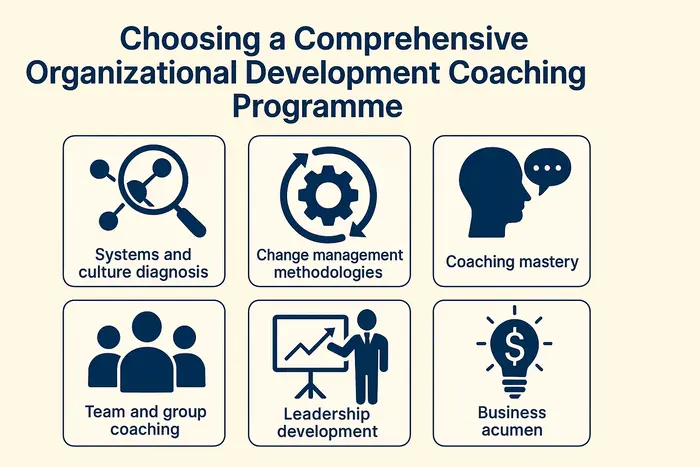
Effective strategic planning and stakeholder management are essential skills for leaders in a rapidly changing business environment. Strategic planning provides...
Organizational development (OD) coaching is not just a series of sessions focused on individual performance; it’s an integrated process of shifting mindsets, systems and culture. In an era where engaged employees drive higher productivity and profitability, the most effective OD coaches are those who embed coaching into the fabric of an organization rather than delivering isolated workshops. This article explores what it means to become a true OD change agent and how to choose training that goes beyond certification to deliver real impact.
Organizational development is a strategic approach to improving an organization’s effectiveness through planned interventions. OD practitioners analyze structures, processes, leadership and culture to design changes that align with business goals. Organizational development coaching weaves coaching methodologies into these interventions. Instead of prescribing solutions, coaches partner with leaders and teams to co-create change, build new capabilities and sustain momentum. They facilitate conversations that help employees explore assumptions, develop self-awareness and commit to new behaviours. The result is not just a one-time transformation initiative but a culture in which continuous improvement becomes part of daily operations.
Global research underscores the importance of employee engagement and leadership development. A report compiled by HR Cloud summarizing Gallup data shows that companies with actively engaged employees experience 21 % higher profitability and 17 % higher productivity compared to those with disengaged workforces. Engagement is driven by factors such as meaningful work, supportive leadership and opportunities for growth. OD coaches help organizations cultivate these factors by developing leaders who coach instead of command, building systems that encourage collaboration and aligning values with actions.
The demand for OD coaching also stems from shifting workforce expectations. Millennial and Gen Z employees seek purpose, feedback and career development opportunities. Organizations that fail to provide these elements risk high turnover and reputational damage. Effective OD coaches help companies design modern performance systems, foster inclusive cultures and develop resilient leaders. In India’s rapidly growing economy, multinational companies and startups alike are investing in coaching to attract and retain talent. The ICF notes that an ICF credential improves credibility with corporate buyers and increases consulting opportunities. Organizations want to work with coaches who adhere to ethical standards and can navigate complex change projects.
Although certification can demonstrate that you’ve completed structured training, it doesn’t guarantee the ability to facilitate transformation. Many courses labelled “Certified Organizational Development Coach” focus on basic coaching skills without teaching systems thinking, culture assessment or organizational design. They may promise quick credentials but deliver minimal practice and no exposure to real change projects. This is similar to the pitfalls of cheap training in other coaching contexts. The ICF warns that only accredited programmes count toward credentials, and so-called “ICF aligned” courses that cut corners may leave you ill-prepared. In the OD space, there’s an even greater risk: if you implement change poorly, you can damage employee morale, erode trust and waste resources.
True OD coaching requires a blend of disciplines: systems theory, psychology, leadership development, change management and coaching. Coaches must understand how organizational structures influence behaviour, how to diagnose cultural issues and how to facilitate group dynamics. They need to coach executives through strategic decisions while simultaneously guiding teams through behaviour shifts. Achieving this level of competence goes beyond learning a coaching script. It demands immersion in organizational contexts, mentorship from experienced practitioners and supervised projects.
The International Coaching Federation provides a robust framework for coaching practice. While the ICF does not offer a separate OD credential, its eight core competencies form the foundation of any professional coaching interaction. An OD coach must demonstrate ethical practice, embody a coaching mindset that is curious and non-judgemental, and create agreements that clarify roles and outcomes. They must cultivate trust and safety so that employees feel comfortable sharing challenges, and they need to maintain presence when conversations become emotionally charged. Active listening, evoking awareness through powerful questions and facilitating growth are equally critical. Applying these competencies at the individual and systemic levels is what distinguishes effective OD coaches.
Moreover, the ICF credential signals to organizations that you’ve undergone rigorous training and adhere to ethical guidelines. In a study cited by Erickson, 80 % of coaches reported that clients expect them to be certified. The ICF’s emphasis on ongoing mentor coaching and continuous development aligns with the dynamic nature of organizational change. As an OD coach, you benefit from belonging to a global community that shares best practices, research and support.
Successful OD coaches shift their focus from delivering discrete coaching sessions to cultivating a coaching culture. In a coaching culture, leaders at all levels develop coaching capabilities, feedback flows freely, and employees feel empowered to experiment and learn. To embed coaching, OD practitioners often begin with leadership teams. They help executives articulate a compelling vision, align around core values and model coaching behaviours. They then cascade coaching skills through workshops, peer coaching circles and on-the-job practice. By integrating coaching into performance management, decision-making and collaboration processes, organizations make coaching a natural part of how work gets done.
Embedding coaching also involves aligning structures and systems with coaching principles. For example, competency frameworks, recognition systems and meeting routines can be redesigned to reward learning, collaboration and initiative. A coach may facilitate design sessions where cross-functional teams redesign processes to improve employee experience. Because OD coaches work at both the individual and systemic levels, they need to navigate organizational politics, communicate with stakeholders and anchor change initiatives in business outcomes.
Consider a mid-sized technology firm struggling with high turnover and siloed departments. Leadership hired a certified organizational development coach to foster a more collaborative culture. Rather than conducting standalone coaching sessions, the coach facilitated an assessment of the company’s culture and systems. They discovered that employees lacked psychological safety and clear career pathways. Through a series of workshops, leaders learned coaching techniques such as active listening and powerful questioning. The coach guided them to implement regular one-on-one coaching conversations and peer learning circles. Concurrently, HR updated performance systems to include developmental goals and peer feedback. Over 12 months, the company saw a significant increase in cross-departmental collaboration, a drop in voluntary turnover and improved engagement scores. The coach’s impact stemmed not from a certificate but from applying coaching to systemic change.

For those aspiring to drive meaningful change, choosing the right training is critical. Look for programmes that are both ICF-accredited and infused with organizational science. A high-quality programme should cover:
Programmes like Erickson’s Art & Science of Coaching break training into multiple modules, gradually expanding from foundational skills to advanced techniques and systems coaching. They integrate neuroscience, NLP and solution-focused methods to give coaches a diverse toolkit. Ensure the programme includes mentor coaching and opportunities to work on real organizational projects. Also evaluate the provider’s experience in corporate environments, industry partnerships and alumni testimonials.
Organizations invest in OD coaching when they see clear benefits for performance and profits. Engaged employees not only produce more but also contribute to innovation and customer satisfaction. The HR Cloud article highlights that companies with highly engaged employees have 21 % higher profitability and 17 % higher productivity. Coaching fosters engagement by providing employees with clear feedback, growth opportunities and a sense of purpose. Additionally, coaching supports diversity and inclusion efforts by encouraging leaders to listen, empathize and create psychological safety. This, in turn, boosts talent retention and strengthens brand reputation.
On a financial level, coaching helps organizations avoid the costs of disengaged employees, which can include lost productivity, turnover, errors and reduced customer satisfaction. Investing in a coaching culture may seem expensive initially, but the long-term ROI is significant: improved innovation, reduced absenteeism, stronger customer relationships and a workforce aligned with the company’s mission. Coaches who can articulate these benefits to decision-makers stand out when bidding for corporate contracts.
A multinational manufacturing firm in Gurugram engaged a certified OD coach to support a digital transformation initiative. Employees resisted new technologies and processes, fearing job loss and increased workloads. The coach worked with the leadership team to design a change strategy that combined transparent communication, training and coaching. They trained managers in coaching skills to support their teams through uncertainty. They also facilitated cross-functional coaching circles where employees shared concerns and co-designed solutions. As a result, adoption rates of the new systems exceeded expectations, and employees reported feeling heard and supported. The project finished on time and under budget, leading to substantial improvements in efficiency and cost savings. The coach’s systems perspective and ability to embed coaching into every stage of the transformation were critical to success.
Another example involves a non-profit organisation aiming to build a leadership pipeline. The organisation partnered with an OD coach who designed a year-long programme combining leadership training, individual coaching and group coaching. Participants learned to coach peers, manage conflict and drive innovation. Over the next two years, the organisation promoted 70 % of participants into leadership roles and improved staff retention rates. Donors noted the organisation’s increased professionalism and strategic clarity. These outcomes demonstrate how OD coaching can elevate not only individual leaders but entire institutions.
Pursuing a Certified Organizational Development Coach designation is a valuable step, but it’s only the beginning of your journey. OD coaching demands mastery of the ICF core competencies, a systems perspective and the ability to design and facilitate change. Certification alone cannot teach you how to embed coaching into organizational culture or drive strategic transformation. To truly make an impact, invest in comprehensive training that combines coaching excellence with organizational science, mentor coaching and real-world application. Remember that engaged employees drive profitability and productivity, and organisations will pay a premium for coaches who can translate these insights into lasting change. By focusing on mastery rather than just a badge, you position yourself as a catalyst for growth and transformation in the companies you serve.
OD coaching integrates coaching methodologies into systemic change, helping leaders and teams shift mindsets, processes, and culture. It goes beyond individual sessions to embed coaching into performance systems, leadership behaviours, and daily operations for sustainable organizational improvement.
Companies with engaged employees see 21% higher profitability and 17% higher productivity. With talent shortages and high turnover, organizations need OD coaches to build coaching cultures, develop inclusive leadership, support digital transformation, and retain millennial/Gen-Z talent.
No. A certificate proves training completion, but real impact requires systems thinking, change management, culture diagnosis, team facilitation, and business acumen. Many “quick” OD certifications lack depth and real-world application, leaving coaches unable to drive lasting change.
The eight ICF competencies (ethical practice, coaching mindset, agreements, trust & safety, presence, listening, evoking awareness, facilitating growth) are essential when coaching individuals, teams, and systems. OD coaches apply them at executive, team, and cultural levels to create psychological safety and sustainable behaviour change.
Choose ICF-accredited training that includes systems & culture diagnosis, change management, team/group coaching, leadership development, business acumen, mentor coaching, and supervised organizational projects. Look for providers with corporate experience and strong alumni outcomes.

Effective strategic planning and stakeholder management are essential skills for leaders in a rapidly changing business environment. Strategic planning provides...

Change Management & Digital Transformation: Build Adaptive Leaders with Erickson Coaching Rapid technological advances, shifting customer expectations and global disruption...

Discover how Erickson’s solution‑focused coaching delivers up to 788 % ROI and drives operational excellence by improving strategic thinking, communication and...

The coaching profession has moved from the margins to the mainstream. Recent global studies show that the number of professional...

India’s economy has transformed dramatically over the last decade, and the demand for top business coach India services has grown...

When searching for a certified life coach program price, it’s natural to start by comparing tuition fees. Aspiring coaches want...

Neuro-Linguistic Programming (NLP) is experiencing a resurgence in India. Social media, workshops and high-energy seminars promise instant breakthroughs by rewiring...

Many professionals pursue the title of Certified Organizational Development Coach with the expectation that a credential alone will open corporate...

Some providers offer to fast-track you to PCC status through purely online modules for a fraction of the cost of...